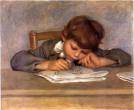|
|
|
| |
|
The Library plays an important part in
supporting our pupils' learning in all subjects and also offers a place for
independent research. It is open throughout the day. Computers are in place for
research / study purposes and provide the full range of programmes common to the
school's networked system.
 The library hosts
a lunchtime study club which is supervised by teachers. Membership is free and
open to all who wish to use the library for quiet study. All pupils are
automatically members of the Library. They are permitted to take out up to three
books (fiction and/or non fiction) for a period of two weeks. Sixth Formers are
permitted five books. The library hosts
a lunchtime study club which is supervised by teachers. Membership is free and
open to all who wish to use the library for quiet study. All pupils are
automatically members of the Library. They are permitted to take out up to three
books (fiction and/or non fiction) for a period of two weeks. Sixth Formers are
permitted five books.
The library is the venue for a number of
lunchtime events such as readings and talks by visiting speakers on a variety
topics.
Outside agencies have brought in hundreds of
books for the pupils and students to buy or choose for the library. We hope to
continue this practice, in order to nurture and to reinforce good reading habits
in Hartismere.
|
|
 |
|
|
| |
|
| |
|
Hartismere follows a whole-school approach to
learning support and therefore all teaching departments plan their work so that
our pupils are offered the greatest opportunity to achieve full potential.
 In addition, there
is a Learning Support Department which works with pupils with learning
difficulties. Pupils are encouraged to take full advantage of the main school
curriculum and are helped to become more independent learners. They are
supported by being taught in small groups which are withdrawn from lessons, in
class support, tutorial-time sessions, lunchtime tuition and help for homework.
Parents are encouraged to help in the programme of support to improve skills and
confidence. In addition, there
is a Learning Support Department which works with pupils with learning
difficulties. Pupils are encouraged to take full advantage of the main school
curriculum and are helped to become more independent learners. They are
supported by being taught in small groups which are withdrawn from lessons, in
class support, tutorial-time sessions, lunchtime tuition and help for homework.
Parents are encouraged to help in the programme of support to improve skills and
confidence.
The Learning Support Department endeavours to
work in partnership with parents to assess, identify and encourage all pupils to
achieve their potential. A full copy of the school's Special Educational; Needs
Policy is available at the school on request.
|
|
 |
|
|
| |
|
| |
|
Our equal opportunities policy is integral
with our curriculum as well as being highlighted from time to time by special
events.
 All departments
are required to re-assess their approaches to the taught curriculum on a regular
basis bearing in mind the composition of the groups in any particular year. The
materials used are chosen with care to reflect an awareness of gender, ability
and cultural background. Our whole school aim and ethos are based on our
commitment to valuing the individual and are reflected in the teaching practices
we encourage. All departments
are required to re-assess their approaches to the taught curriculum on a regular
basis bearing in mind the composition of the groups in any particular year. The
materials used are chosen with care to reflect an awareness of gender, ability
and cultural background. Our whole school aim and ethos are based on our
commitment to valuing the individual and are reflected in the teaching practices
we encourage.
In general, most extra curricular activities
and trips are organised to provide equality of opportunity - with the proviso
that some are targeted at particular groups for curriculum reasons, or because
they form part of the programme of activities for a year group. Year 9, for
instance, take part in 'Industry Day' annually to foster and promote equality of
opportunity.
|
|
 |
|
|
| |
|
| |
|
We
try to ensure that our curriculum enable pupils to move with ease into work or
further education. In addition all pupils are given information and guidance
about careers in their Personal, Health and Social Education with the
PSHE tutor playing a major role. Professional support is
provided by Suffolk Careers.
 During Year 11
all pupils are offered an interview with the careers officer. All Year 10 pupils
participate in the Work Experience Scheme in the summer term. During Year 11
all pupils are offered an interview with the careers officer. All Year 10 pupils
participate in the Work Experience Scheme in the summer term.
There are information evenings for parents and
pupils in Years 10 and 11. Similar arrangements are made for 6th Formers.
|
|
 |
|
|
| |
|
| |
|
 We
consider it very important that all our pupils and students should develop
respect and tolerance for people from all cultural backgrounds. Thus an
awareness and understanding of different cultures is promoted in both our
teaching and in the general school atmosphere. A disrespect for people from
other cultures is not tolerated. We
consider it very important that all our pupils and students should develop
respect and tolerance for people from all cultural backgrounds. Thus an
awareness and understanding of different cultures is promoted in both our
teaching and in the general school atmosphere. A disrespect for people from
other cultures is not tolerated.
|
|
 |
|
|
| |
|
| |
| In accordance with LEA guidelines Sex
Education is taught mainly through PSHE and biology lessons. Appropriate
aspects are taught to pupils in year groups through the school. In our
teaching we emphasise the central rôle of the family unit, and the
responsibility of the individual within that context |
|
 |
|
 |